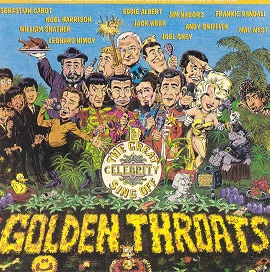The Atrocious Music Collection: #18 in a series
Artists: Various
Album Title: Golden Throats: The Great Celebrity Sing-Off
Category: Celebrity Compilation
Year: 1988
Cover art style: Sgt. Pepper's Parody
Audio samples: see below
Acquisition: Jack's Records, Red Bank, NJ
Click on picture for full-sized image
Like any good compilation album, Golden Throats provided a short-cut to starting a collection, and Rhino Records made that possible with this record... and quite a few others. Rhino Records was founded in 1978, and more than once has been the friend of the collector of the off-beat, the unusual, the atrocious. A big tip of the hat to them – this is not the only Rhino Record in the Collection.
As time wore on, these complication records became less important to me as I found the originals. I’ve already addressed the two Star Trekkers represented here, namely Leonard Nimoy and William Shatner. If you remove them, what’s left is example after example of the classical mismatch: the wrong singer paired with the wrong song.
Rhino was smart enough to get the one-and-only Irwin Chusid to do the liner notes, but it is the Mick Jagger quote reprinted on this record that has stayed with me: “It’s not the song, it’s the singer.” Chusid contributes his own truism, pointing out the "mistaken belief that a pre-eminent talent in one field is converted to another at an equivalent exchange rate,” a rule that we would all be well-served to keep in mind.
For the actual singers, you get the impression they were just trying to stay relevant through changing times and changing tastes in music. I’ve had the pleasure of meeting Joel Grey (after seeing him perform Gershwin – in other words, the right songs for Grey), and I’m not going to bad-mouth someone who has this much talent. I will merely point out that his cabaret version of the bluesy/psychedelic White Room is... well, unusual.
Unfortunately, with the exception of Misters Nimoy, Shatner, and Grey (a great law firm) , the “stars” represented on this disc were largely minor and/or past their prime even back in 1988, when this record was released. Some of these names will not even register as "once-famous" today, but the web never forgets – you’re welcome to Google-pedia them all you want.
Eddie Albert’s fame came through the TV show Green Acres, as well as movies like The Longest Yard. His version of Dylan’s Blowin’ in the Wind is so positive, so confident, one gets the impression he is quite sure exactly how many roads a man must walk down before you call him a man – and he also has answers to all these other questions Dylan poses. Frankly, there’s a Reaganesque quality to this which seems the absolute antithesis of the true meaning of the song.
Dylan also gets the spoken-word treatment by Sebastian Cabot, most well known at the time of his 1967 record Sebastian Cabot, actor/Bob Dylan, poet, for voice work in many Disney animated movies. (Soon after the record, he would grace the small screen as Mr. French, the role he became best known for.) It’s a whole record of dramatic Dylan-readings - but we get only two cuts: Like a Rolling Stone and It Ain’t Me Babe. It sure ain’t Dylan, babe, and although it’s enjoyable stupid, it is not nearly as insane as Shatner’s take on Dylan’s Mr. Tambourine Man.
I always wonder if all of these dramatic “musical” readings of Dylan were an influence on the Nobel committee…
Jim Nabors should be given credit for doing Stevie Wonder’s You Are the Sunshine of My Life just one year after Stevie released it. In 1973, this was a progressive stance for a white singer with a largely conservative following. This was the guy who sang Back Home Again in Indiana prior to the start of the Indianapolis 500 for some 40 years, after all. So points there. But, man, it’s hard to get over the mismatch of style here.
Noel Harrison was the son of Rex Harrison, who spoke/sang his way to Broadway fame. Noel’s treatment of A Whiter Shade of Pale is so flat, one wonders if he understands what singing is, and that at least some emotional connection to the song is recommended. He should have listened to his father more.
And so it goes – crooner Frankie Randall’s version of I Can See for Miles, and the incomparable Mae West’s very comparable take on Twist and Shout are more of the same. At the bottom of the barrel, though, is tough guy Sgt. Joe Friday, actor Jack Webb, who someone – a real person, we can only surmise – thought should talk through Try a Little Tenderness in his “just the facts ma’am” cop-voice. This is wonderfully awkward wince-worthy stuff.
There were ultimately four volumes of Golden Throats, all trying to prove Mick right. Next up is the only other one I ever owned, GT2: More Celebrity Rock Oddities.

